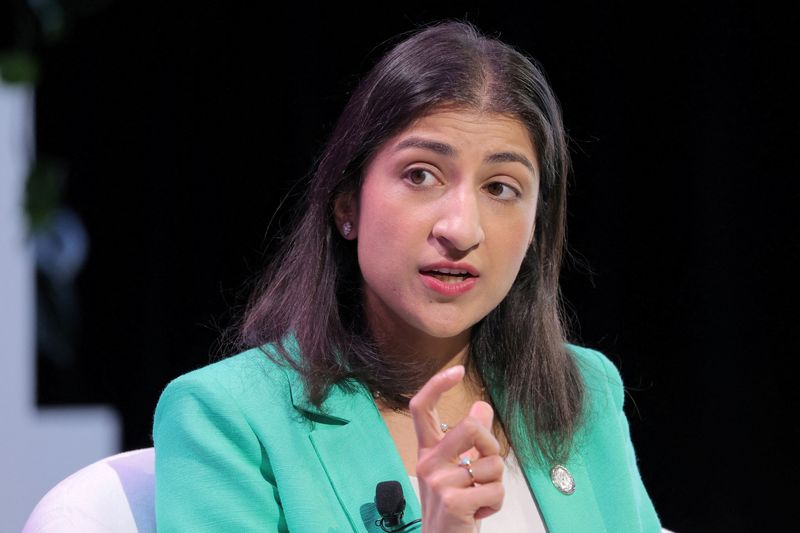By Jody Godoy
(Reuters) - Federal Trade Commission Chair Lina Khan's initiative to use antitrust laws to protect workers is being tested at a trial that began on Monday, as the agency alleges that grocery chain Kroger (NYSE:KR)'s proposed merger with rival Albertsons (NYSE:ACI) would crush the bargaining power of unionized workers.
Khan and her fellow antitrust enforcers in the Biden administration have sought to use antitrust laws - deployed in recent decades mostly to protect consumers against high prices - to combat what they view as anticompetitive practices squeezing workers' paychecks.
Labor has been an area of focus for Khan, a former law professor and congressional antitrust counsel, who took the reins of the agency in June 2021.
"Since stepping into the role of Chair, I have been reminded, over and over, of the ways that the FTC’s decisions deeply and directly affect the well-being of people who work for a living," Khan said at a speech at Harvard University in February.
"It's really important for her," said Rebecca Haw Allensworth, an antitrust professor at Vanderbilt Law School, referring to Khan. "This is the first high-profile example of them trying to go after a merger using a labor market theory."
The lawsuit alleges the merger would concentrate ownership and lead to higher grocery prices.
The new company would own more than 50% of the grocery stores in Washington state and make up just under half of grocery sales in Arizona, the attorneys general of both states have warned separately.
The FTC also argues the deal should be blocked because it decreases the ability of unions to play the two chains off each other in bargaining for wages and benefits, particularly in California and other states in the U.S. West where some Kroger and Albertsons stores are located near one another.
The United Food and Commercial Workers union has said that in Los Angeles and Orange counties, 115 of 159 Albertsons stores are located within 2 miles (3.22 km) of a Kroger, leaving them susceptible to closures if Kroger fails to keep its promise to keep stores open.
Kroger's attorney said on Monday during opening arguments in the case that the company is a "proud union shop" and would continue to honor collective bargaining agreements with Kroger and Albertsons workers after the deal.
The company has said no stores will close as a result of the merger, and that frontline employees will not lose their jobs, and that it would spend $1 billion on improving wages and benefits.
"The only winners if this merger is blocked will be larger, non-unionized retailers who will continue to fight union growth," a Kroger spokesperson said in a statement.
Kroger and Albertsons have argued in court papers that they would be allowed to jointly bargain with unions even without a merger.
"Text and precedent make clear that the antitrust laws have no place in the field of labor relations," they said.
The National Labor Relations Board weighed in last week, urging the judge overseeing the case to reject Kroger's argument that labor law prevents the FTC's claims.
Experts said that a hurdle for the FTC will be showing that union grocery store jobs form a unique labor market, and are not readily interchangeable with other grocery and retail jobs.
"The court may or may not buy that," Allensworth said.
Khan has made labor market competition a focus of her tenure, to the chagrin of some business groups who have complained the agency is going too far.
The FTC's ban on noncompete agreements was recently blocked by a court in Texas after the U.S. Chamber of Commerce sued over the rule.
The FTC and Justice Department last year included labor and suppliers among aspects they scrutinize in merger reviews.
The FTC has raised labor concerns in cases seeking to block acquisitions by mattress manufacturer Tempur Sealy (NYSE:TPX) International and luxury handbag purveyor Tapestry (NYSE:TPR).
While the Kroger acquisition is the first merger case to go to trial over effects on unionized labor, experts said it builds on other cases.
The Justice Department, states and private plaintiffs have successfully used antitrust laws to challenge restrictions on college athletes, and the Justice Department blocked the Penguin Random House and Simon & Schuster merger over concerns it would lower contract rates for authors.

Claire Kelloway, of the anti-monopoly think tank Open Markets Institute, said while the Kroger case could be decided on grocery prices alone, any ruling on the FTC's labor claims could boost further efforts to challenge mergers over adverse effects on workers.
"It would definitely open up a lot of new potential areas for thinking about how mergers harm labor markets," she said.